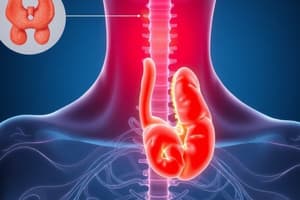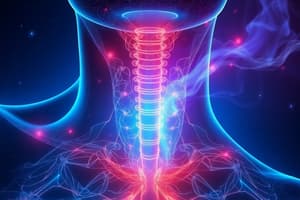Podcast
Questions and Answers
What is the main mechanism of action of thiocyanate in relation to iodide?
What is the main mechanism of action of thiocyanate in relation to iodide?
- Blocks thyroid hormone synthesis
- Enhances iodide uptake
- Competitive inhibition of iodide transport (correct)
- Stimulates thyroid gland activity
Which type of hypothyroidism is characterized by the autoimmune destruction of the thyroid?
Which type of hypothyroidism is characterized by the autoimmune destruction of the thyroid?
- Drug-induced hypothyroidism
- Dyshormonogenesis
- Hashimoto’s thyroiditis (correct)
- Iodine deficiency
What is the typical degree of hypothyroidism associated with radiation-induced thyroid damage?
What is the typical degree of hypothyroidism associated with radiation-induced thyroid damage?
- Mild to severe
- Severe, requiring levothyroxine indefinitely (correct)
- Mild to moderate
- Mild
Which condition is associated with sodium perchlorate in terms of thyroid function?
Which condition is associated with sodium perchlorate in terms of thyroid function?
What type of hypothyroidism is generally absent of goiter?
What type of hypothyroidism is generally absent of goiter?
What is the consequence of the destruction of thyroid cells?
What is the consequence of the destruction of thyroid cells?
What characterizes Grave's disease?
What characterizes Grave's disease?
Which condition is primarily associated with a prolonged action of TSH antibodies?
Which condition is primarily associated with a prolonged action of TSH antibodies?
What is a notable ocular symptom associated with TSH?
What is a notable ocular symptom associated with TSH?
What triggers the release of thyroid hormones in response to environmental challenges?
What triggers the release of thyroid hormones in response to environmental challenges?
Which statement is true regarding hyperthyroidism?
Which statement is true regarding hyperthyroidism?
What effect does a lack of thyroid hormones have on the body?
What effect does a lack of thyroid hormones have on the body?
What is the role of thyroid peroxidase in thyroid hormone production?
What is the role of thyroid peroxidase in thyroid hormone production?
Which medication is a combination of T4 and T3 used in the short-term suppression of thyroid function?
Which medication is a combination of T4 and T3 used in the short-term suppression of thyroid function?
What is the shelf life of Liotrix when stored properly?
What is the shelf life of Liotrix when stored properly?
What is the primary action of thioamides like Methimazole and Propylthiouracil?
What is the primary action of thioamides like Methimazole and Propylthiouracil?
Which of the following is a potential adverse drug reaction (ADR) associated with thioamides?
Which of the following is a potential adverse drug reaction (ADR) associated with thioamides?
What is the major benefit of using iodides in treating thyroid conditions?
What is the major benefit of using iodides in treating thyroid conditions?
Which condition is treated with the combination medication Liotrix?
Which condition is treated with the combination medication Liotrix?
What is the potency comparison between Methimazole and Propylthiouracil?
What is the potency comparison between Methimazole and Propylthiouracil?
Which of the following medications is used for preparation in surgical thyroidectomy?
Which of the following medications is used for preparation in surgical thyroidectomy?
What cardiovascular effect is commonly associated with thyrotoxicosis?
What cardiovascular effect is commonly associated with thyrotoxicosis?
Which treatment is contraindicated in patients with asthma who have thyrotoxicosis?
Which treatment is contraindicated in patients with asthma who have thyrotoxicosis?
What neurological symptom is typically seen in hypothyroidism?
What neurological symptom is typically seen in hypothyroidism?
In thyrotoxicosis, the gastrointestinal system's typical response includes increased:
In thyrotoxicosis, the gastrointestinal system's typical response includes increased:
What is a common musculoskeletal symptom of thyrotoxicosis?
What is a common musculoskeletal symptom of thyrotoxicosis?
What renal change is typically seen in hypothyroidism?
What renal change is typically seen in hypothyroidism?
Which cardiac condition is associated with hypothyroidism?
Which cardiac condition is associated with hypothyroidism?
What respiratory complication is commonly associated with thyrotoxicosis?
What respiratory complication is commonly associated with thyrotoxicosis?
Which of the following is a potential disorder resulting from thyrotoxicosis-related bone changes?
Which of the following is a potential disorder resulting from thyrotoxicosis-related bone changes?
What is a common gastrointestinal symptom of hypothyroidism?
What is a common gastrointestinal symptom of hypothyroidism?
What finding on an ECG is commonly associated with hypothyroidism?
What finding on an ECG is commonly associated with hypothyroidism?
What outcome is associated with hypercalcemia in the context of thyrotoxicosis?
What outcome is associated with hypercalcemia in the context of thyrotoxicosis?
Which condition does hypoproteinemia often indicate in the context of thyroid diseases?
Which condition does hypoproteinemia often indicate in the context of thyroid diseases?
What physiological change in the cardiovascular system occurs during thyrotoxicosis?
What physiological change in the cardiovascular system occurs during thyrotoxicosis?
In hypothyroidism, what is the expected change observed in deep tendon reflexes?
In hypothyroidism, what is the expected change observed in deep tendon reflexes?
What condition is associated with congenital hypothyroidism and characterized by mental retardation in infants?
What condition is associated with congenital hypothyroidism and characterized by mental retardation in infants?
In which condition is the secretion of TSH absent due to pituitary disease?
In which condition is the secretion of TSH absent due to pituitary disease?
What is the emergency treatment for myxedema coma?
What is the emergency treatment for myxedema coma?
Which clinical feature is NOT typical of myxedema coma?
Which clinical feature is NOT typical of myxedema coma?
What is the primary medication used to treat hyperthyroidism?
What is the primary medication used to treat hyperthyroidism?
During pregnancy, how much should the thyroxine dose be increased to normalize TSH levels?
During pregnancy, how much should the thyroxine dose be increased to normalize TSH levels?
Which laboratory finding is typical in hyperthyroidism?
Which laboratory finding is typical in hyperthyroidism?
What is the first-line treatment for patients with very large thyroid glands?
What is the first-line treatment for patients with very large thyroid glands?
Which autoimmune condition stimulates antibodies to thyroidal antigen, resulting in hyperthyroidism?
Which autoimmune condition stimulates antibodies to thyroidal antigen, resulting in hyperthyroidism?
What is the primary symptom of severe hypothyroidism?
What is the primary symptom of severe hypothyroidism?
Flashcards are hidden until you start studying
Study Notes
Thyroid Disorders
-
Hypothyroidism: A condition where the thyroid gland does not produce enough thyroid hormones (T3 and T4).
- Causes:
- Hashimoto's thyroiditis: Autoimmune destruction of the thyroid gland.
- Drug-induced: Blocked hormone formation.
- Dyshormonogenesis: Impaired synthesis of T4 due to enzyme deficiencies.
- Radiation exposure: Destruction or removal of the thyroid gland.
- Congenital (cretinism): Athyreosis or ectopic thyroid, iodine deficiency, or TSH receptor blocking antibodies.
- Secondary (TSH deficit): Pituitary or hypothalamic disease.
- Symptoms:
- Skin & Appendages: Macroglossia, hypoproteinemia, decreased bowel movements, ascites.
- Cardiovascular: Increased peripheral vascular resistance, decreased heart rate, stroke volume, cardiac output, and pulse pressure. Low output heart failure, bradycardia, prolonged PR interval, flat T wave, and low voltage in ECG.
- Respiratory: Pleural effusions, hypoventilation, and CO2 retention.
- Gastrointestinal: Decreased appetite, decreased frequency of bowel movements.
- Central Nervous System: Lethargy, general slowing of mental processes, neuropathies.
- Musculoskeletal: Stiffness and muscle fatigue, decreased deep tendon reflexes.
- Renal: Impaired water excretion, decreased renal blood flow, and decreased glomerular filtration rate.
- Metabolic: Decreased basal metabolic rate, slight positive nitrogen balance.
- Management:
- Levothyroxine: The main medication for hypothyroidism.
- Myxedema coma: End state of untreated hypothyroidism.
- Symptoms: Weakness, stupor, hyponatremia, hypoventilation, hypoglycemia, hypothermia, water intoxication, shock, and death.
- Treatment: IV levothyroxine (loading dose 300-400 mcg, followed by regular dose of 50-100 mcg).
- Hypothyroidism during pregnancy: Increase levothyroxine dose by 30-50% to normalize TSH levels.
- Causes:
-
Hyperthyroidism: A condition where the thyroid gland produces too much thyroid hormone.
- Grave's disease: An autoimmune disorder where antibodies against TSH receptors stimulate thyroid hormone production.
- Symptoms: Nervousness, hyperkinesia, emotional lability, increased appetite, increased frequency of bowel movements, weakness and muscle fatigue, increased deep tendon reflexes, mild polyuria, dyspnea, increased basal metabolic rate, hyperglycemia, and negative nitrogen balance.
- Lab tests: Elevated T3, T4, FT3, FT4, suppressed TSH, presence of anti-thyroglobulin, thyroid peroxidase, and TSH-R antibodies.
- Management:
- Antithyroid medications: Methimazole and Propylthiouracil (PTU).
- Surgery: Thyroidectomy (DOC for patients with very large gland or multinodular goiter).
- Radioactive Iodine (RAI): Causes destruction of the thyroid gland.
- Beta blockers: Propranolol (adjunct treatment for thyroid storm, hypertension, tachycardia, and atrial fibrillation).
- Grave's disease: An autoimmune disorder where antibodies against TSH receptors stimulate thyroid hormone production.
Thyroid Medications
- Thioamides: Inhibit thyroid peroxidase and block organification (methimazole, propylthiouracil, and carbimazole).
- Fatal ADR: Agranulocytosis.
- Iodides: Inhibit organification and hormone release, reduce gland size and vascularity.
- Uses: Preparation for thyroidectomy.
- Examples: Lugol's solution and Potassium iodide.
- ADR: Cholestatic jaundice.
- Beta blockers: Propranolol (used to manage symptoms of hyperthyroidism).
- Liotrix: Combination of T4 and T3 (ratio 4:1).
- Use: Short-term suppression of TSH.
- Shelf life: 2 years.
Thyroid Tests
- TSH (Thyroid Stimulating Hormone): Used to assess thyroid function.
- T3 and T4: Measure thyroid hormone levels.
- FT3 and FT4: Measure free thyroid hormone levels.
- Anti-thyroglobulin and thyroid peroxidase antibodies: Used to diagnose autoimmune thyroid diseases.
- TSH-R antibodies: Used to diagnose Grave's disease.
Studying That Suits You
Use AI to generate personalized quizzes and flashcards to suit your learning preferences.



